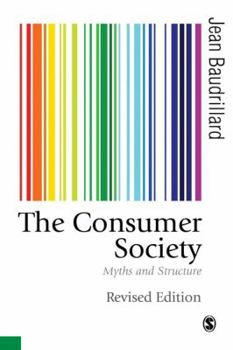The Consumer Society: Myths and Structures
Select Format
Select Condition 
Book Overview
Jean Baudrillard's classic text was one of the first to focus on the process and meaning of consumption in contemporary culture. Originally published in 1970, the book makes a vital contribution to current debates on consumption. The book includes Baudrillard's most organized discussion of mass media culture, the meaning of leisure, and anomie in affluent society. A chapter on the body demonstrates Baudrillard's extraordinary prescience for flagging vital subjects in contemporary culture long before others. This English translation begins with a new introductory essay.
Format:Paperback
Language:English
ISBN:1473982383
ISBN13:9781473982383
Release Date:March 2017
Publisher:Sage Publications Ltd
Length:240 Pages
Weight:0.85 lbs.
Dimensions:0.6" x 6.1" x 9.1"
Customer Reviews
2 ratings
A Great Introduction to a General Theory of Consumption
Published by Thriftbooks.com User , 17 years ago
Of Baudrillard's many books, The Consumer Society is a ground breaking work and a clear advance from Liberal and Marxist interpretation of the capitalist economy. Baudrillard deploys structural analysis to decode what he later develops into theories of simulation, hyperealty, among others. In the consumer society his approach is still grounded in structuralist and Marxian approaches. Despite its academic approach, this is one of Baudrillard's most accessible works and, truthfully, a better place to start that his later work - Simulacra and Simulations - popularized by the Matrix. His work really extends arguments made by Veblen, Galbraith and Vance Packard, with regard to consumption operating as a system of communicating social status. However, he develops these themes more systematically, borrowing from Barthian semiology to begin his development of a enlarged theory of consumption as a communication system with the power of reordering society toward a system based no longer on needs but desires. The result is a more thorough analysis and broader critique: it is a cornerstone work in the development modern consumer theory and the beginning of a psychology of consumption. For Baudrillard, this is the start point to a fatalistic system whose telos is not some Hegel cum McLuhan universal spirit but one of catastrophe and implosion. A world where realty has been exchanged for an image or sign that increasing has no reference to the real. Since consumer has been reordered from a firm basis of need to a slippery one based on desire, the consumer society is insatiable and superficial creating an unstoppable advance that Baudrillard believes can only end in catastrophe. Baudrillard is a prolific writer and perhaps the most important social thinker of the past 20 or 30 years. I recommend this book as one of his most relevant and accessible texts.
Symbolic exchange
Published by Thriftbooks.com User , 23 years ago
This book is an earlier text of Baudrillard. Baudrillard is considered as a major theorist of postmodernism. But at the time he wrote this book, he was not postmodernist but Marxist. In 1973, Baudrillard divorced with Marxism. But before that year, he maintained the Marxist stance. His main subject was the political economy in Marxist style and the society of consumption in Frankfurt school¡¯s style. He was a pupil of Henry Lefevre who expanded the scope of Marxism into the study of everyday life. Baudrillard took the area his mentor opened up, but approached it somewhat differently: he borrowed frameworks of structuralism. He transformed Marx¡¯s distinction of use value/exchange value into the semiotics of consumption. Society is the field where symbolic exchange, in Marcel Mauss¡¯s term, takes place. What is exchanged in symbolic exchange is not use value but exchange (or symbolic) value. We consume the object not only of its use value but of its symbolic value. Object is exchanged as sign in symbolic exchange. Goods could signify the social status. Object could be desired not only in its use value but in its symbolic value that make difference to its owner from others: consumption could be interpreted as the logic of social distinction. In later texts, he asserted that capitalist society is centered not on production but on consumption. There could be not much objection upto this point. But, he argues, the logic of social distinction is not produced by consumer. It¡¯s the system of signification that is imposed on consumer. In this point, Baudrillard depicts such an unreal picture of iron cage as Frankfurt school did. The system of signification is illustrated as the something of a big brother we can¡¯t exercise any say. But that kind of image is not the one we experience in daily life. Marx said, ¡®Men make history, but not in their own choice.¡¯ Social fact like language transcend individual. We didn¡¯t choose our own mother tongue. We were born into it. But it doesn¡¯t deny the point that we make history. The system Baudrillard delineated is not unearthly fantasy. But where does it come from? It¡¯s the creature we make and change day by day. But in Baudrillard¡¯s world, such a point is lost. On Baudrillard¡¯s picture, the individual is lost. Baudrillard only takes a shot of horror film. In terms of methodology, Baudrillard makes non-sense.






